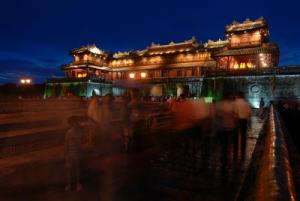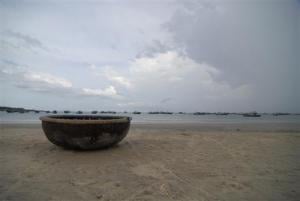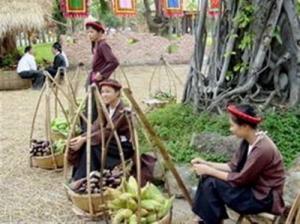Hat Tuong - Classical drama seeks ways to survive

Tuong (classical drama) is part of the traditional spiritual heritage of the nation, but with a lack of spectators the art is in danger of falling by the wayside.
Under the radiant stage light, actress Minh Gai depicts the torment of Lady Ba Can, a female general, after she decided to execute her elder brother for his betrayal of the Motherland.
This is a part of the tuong (classical drama) play De Tham, about a national hero who fought the invading French troops in the 19th century.
The actress expresses the character’s torment through a multitude of facial features, steps and hand movements.
Vietnamese classical drama originated in the 12th century, but was strongly developed in the 17th century.
Along with arts such as cheo (traditional operetta) and water puppetry, classical drama has contributed to the creation of the national-cultural characters of Viet Nam.
But the art now faces tough times. The performances garner few spectators, when compared to other performing arts in the country.
Historically, classical drama has experienced ups and downs, which has largely depended on views of the ruling authorities at the time.
The Tran Dynasty (1225-1400) thought highly of tuong, but the Le Dynasty (1428-1527) that followed despised it.
During the Nguyen Dynasty (1802-1945), the art was restored, but in the years following the August Revolution of 1945 it was banned. The local leaders at the time considered the art to be a "product of the feudal regime".
In 1951, the Party decided to restore and develop classical drama and traditional operetta.
In order to gain public attention, the artists had to overcome many hardships, says a well-know actress of the Viet Nam National Tuong Theatre, Huong Thom.
"For arts like drama, cheo and folk songs, amateurs can practise and perform a little bit, but for tuong, you cannot do it if you have not been properly trained.
"This art requires the performers to practise very hard. To perform its movements, you must use the whole body, from the fingers and elbows to all the muscles. If you do not have a strong voice, you will not be able to sing the songs for classical drama and express the emotions of each character.
"The performance is also very exhausting. The actors and actresses have to sing, dance and even somersault while they wear the costumes that can weigh up to 10kg. During the hot season, sweat can be wrung out of our clothing like water," she says.
Nguyen Thi Loc Huyen, a young star at the National Tuong Theatre, says she also performs pop music and quan ho (traditional love duets from Bac Ninh Province) to help support her family.
Huyen successfully performs as Miss Thanh, the adopted daughter of national hero De Tham. Huyen depicts Thanh’s state of mind, after Tham considered her just a little girl. Hurt and downtrodden, Thanh then decides to go to the enemy’s camp alone in order to kill their commanders.
"Although our lives are still hard, I have a passion for classical drama. I hope the art will continue to develop and people like it as much as they like pop music."
In the past decade, pop art and multi-media entertainment has penetrated into the spiritual life of the Vietnamese people. In effect, tuong and many other traditional arts are now being ignored and can hardly attract viewers, especially among the youth.
Instead of going to classical drama theatres, many people stay at home to enjoy pop music, karaoke, internet and computer games, along with attractive movies on dozens of TV channels.
"A lack of viewers is a thorny issue among classical drama artists at the moment because the audience is key to the survival of stage arts and for classical drama in particular," says Professor Hoang Chuong, director of the Centre for Study, Preservation and Development of National Culture.
At the Hong Ha Theatre, the only theatre in Ha Noi for classical drama performance, there are only a small number of viewers and many of them are quite old.
National Tuong Theatre director People’s Artist Hoang Khiem, says the art now faces a crisis.
"It is very hard to arrange a play, but sometimes we are only able to sell a few tickets to mostly older spectators.
"Also, it is hard to select young performers, because not many young people apply to study the arts at their university entrance exams."
Khiem says that artists understand their own responsibility for the situation.
"We can still hardly the meet demands of modern society. We lack great plays that will be remembered by viewers.
"Many urban citizens are not interested in this art, so the classical drama troupes have to perform in remote and isolated areas."
The deputy head of the Theatre Research Institute of the University of Theatre and Cinematography, Nguyen Van Thanh, says he worries about the state of traditional drama’s popularity in the country during recent years.
"Many directors and actors have to quit their troupes, because it doesn’t pay well. Many actors have to change their jobs to earn their living.
"None of the actors can live on the money from classical drama performances only, even if they belong to the National Tuong Theatre," he says.
For troupes in smaller provinces, the situation is even worse. The tuong troupe in the northern province of Thai Binh used to perform for several families. Nowadays, for a performance each actor receives about VND100,000 (US$5.5), which doesn’t account for the labour involved with planning the performance or travel expenses. But they are still happy to "earn a little bit from the art rather than doing nothing".
Because of their love for classical drama, artists have tried many things to help preserve and develop it.
They understand that classical drama does not have the same appeal as other arts, but it is attractive only to people who understand it. So, people who have a responsibility to classical drama choose to train their own viewers, especially with students.
National Tuong Theatre artists have organised meetings with students to perform and talk with them in order to help them understand the art.
Its director, Hoang Khiem, says the theatre now co-ordinates with tourism companies to organise two shows for tourists each week.
"The economic efficiency of our operation is still low, but we have improved at marketing to foreigners, who are then able to learn about Vietnamese culture.
"Our theatre also co-ordinates with the University of Theatre and Cinematography to help enrol students from regions where classical drama existed, like Thanh Hoa, Bac Ninh and Bac Giang provinces and Ha Noi."
Director of Hue Royal Theatre, Nguyen Hai, says his troupe performs classical drama as part of their productions for travellers during their tours to Hue’s ancient citadel.
Artist Nguyen Ngoc Quyen, director of Thanh Hoa Province Classical drama Troupe, says they have introduced the art to local schools.
The Nguyen Hien Dinh Classical Drama Theatre in Da Nang has also successfully organised its programme, "Art stage in schools", to introduce classical drama in schools to create interest among young viewers.
"Many students of local schools like the art, they can perform many plays very successfully and they often visit us to further study the art," says People’s Artist Tran Dinh Danh, the theatre’s director.
Along with restoring traditional plays, the theatres now also compile new performances that express modern life and foreign plays.
People’s Artist Pham Thi Thanh says, classical drama is an important art so it is necessary "to train young spectators".
"We should have a new generation of viewers who understand and like classical drama. The Government should make stage arts part of the required curriculum."
Moreover, most researchers say the State should give a priority to a policy that encourages classical drama.
Professor Hoang Chuong says there are more than 100 ancient plays that have not been arranged to perform.
"The State should invest for troupes to arrange these performances. Besides, we should further educate people, so that by 2020, the ratio of people who love classical drama and watch it will be about 50-60 per cent of the total population.
"If we do not have a timely policy to save classical drama, this art may fall into oblivion," he says.
Hoang Khiem says the efforts of each troupe to attract spectators is just a provisional solution.
"For the future, we need to have a strategy to put classical drama into the schools’ curriculum. There’s no need for students to know how to sing and dance, they only need to learn how to enjoy and understand traditional arts."
Themes include monarch loyalty, patriotic duty
Tuong was developed from a folk art to be a royal art. Its themes include monarchist loyalty and patriotic duty. These essential themes define the play’s structure, features, language, music, colour, struggles and the personality of the characters.
Tuong consists of dance and music, which are highly stylised and filled with symbolism. The actors’ symbolic gestures and a good deal of imagination from the audience helps create the scenes. Mountains, rivers, palaces, long roads, horseback riding and battlefields are created on stage using minimal props and other equipment.
There are seven professional tuong theatres in Viet Nam: the Viet Nam National Tuong Theatre, the theatres in Thanh Hoa, Hue, Da Nang, Binh Dinh, Khanh Hoa and HCM City.
Heritage Alert series valuable contribution
The communication project Heritage Alert, with funds provided by the Ford Viet Nam Company, concludes after one year of implementation, and this story will be the last among the series.
The project consists of more than 40 stories run in The Thao & Van Hoa (Sports and Culture) Newspaper and 24 stories run in the Viet Nam News Sunday.
The Thao & Van Hoa also held talks recently to review the project. The talks saw the participation of many researchers, cultural managers and journalists, along with people who pay attention to Vietnamese cultural heritage.
Deputy editor-in-chief of The Thao & Van Hoa Truong Le Kim Hoa, said that the project’s success could be seen, as many people cared about the survival of cultural heritage.
Although the project has ended, the Viet Nam News will continue to run stories on the topic to further inform readers, thus contributing to the efforts of the community to preserve and develop living heritage.
Read our blog about Hat Tuong:
http://vietnam.com/blog/hat-tu%E1%BB%93ng-theater-2/









